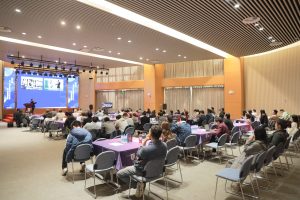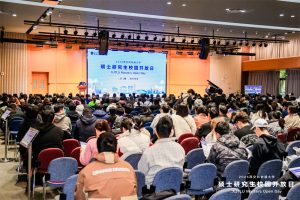31 May 2016
Xi’an Jiaotong-Liverpool University’s first research festival took place yesterday as a key part of the University’s 10th anniversary celebrations.
The festival, which featured presentations by researchers from across the University, a keynote speech by Professor Rick Rylance, from the School of Advanced Study at University of London, as well as a poster event and knowledge exchange, celebrated 10 years of creating new knowledge at XJTLU.
It was attended by XJTLU staff and postgraduate students as well as external guests, including Jiang Weiming, deputy executive director of Suzhou Dushu Lake Science and Education Innovation District, who, in his guest speech, hailed XJTLU as a “leader and pioneer” amongst Sino-foreign universities in China.

In his opening comments, Professor David O’Connor, dean for research and graduate studies at XJTLU, gave an overview of the development of research at XJTLU, from it being a “minor part of the agenda” when the University first opened to the “vast amount of interdisciplinary research” now taking place.
“We can be proud that we have such a high level of research going on. We’re at the beginning of the journey but it’s fair to say we’ve made a fantastic start,” he said.
He also extended his thanks to those who had supported research at XJTLU over the past decade, including local government in Suzhou and those who established the University 10 years ago.

Underpinning the interdisciplinary approach that XJTLU takes to its research, Professor O’Connor spoke about plans to open an interdisciplinary research centre on the University’s new South Campus in July.
The centre will build specialist teams of researchers, made up of academics from XJTLU and researchers from external companies in China and abroad, to work on highly-focussed, key questions that will move a discipline or particular commercial problem along.
“We’re hoping this kind of model will work well in this environment and I’m quite optimistic that it will,” said Professor O’Connor.
Professor Rick Rylance, who until recently was CEO of the Arts and Humanities Research Council and Chair of Research Councils UK, called the new research centre a “very forward-looking development”.

Professor Rylance, whose keynote speech addressed research policy and management, spoke about the importance of collaboration, especially to XJTLU’s future development: “Collaboration isn’t easy to do, so as an institution like XJTLU starts to develop it has to think about how it collaborates quite carefully,” he said.
Ronglian Zhou, dean of Xi’an Jiaotong University Suzhou Research Institute, attend the event and was impressed by the collaborative, interdisciplinary nature of the research at XJTLU: “The research at XJTLU is very interdisciplinary, which is a trend worldwide. Interdisciplinary teams and research topics lead to extraordinary outcomes,” she said.
She also recognised XJTLU’s work in researching China-specific topics from an international point of view, saying: “Much of the research here is using international perspectives and international-standard methodology to study problems that China is facing now. This is very important.”
Showcasing academic research at XJTLU
As part of the event, six academics from XJTLU presented on their work and research:
- David Goodman presented on his 30-year career working in China, with a particular focus on his work on the notion of class in China
- Li Yang spoke about her project on incorporating graphene into single molecule electronic devices
- Christiane Herr spoke about cross-cultural architectural design and integrating international design concepts into the local context
- Wei Wang focussed on the Internet of Things and smart and intelligent applications, especially distributed intelligence for smart cities
- Pascal Grange showcased his role in a project cracking the genetic code underlying the function of the brain
- Ron Schramm focussed on his book that looks at the key drivers for the Chinese economy.
David Afolabi, a third-year PhD student in computer science at XJTLU, attended the event to hear more about the other research taking place at XJTLU.
“The talks were quite enlightening,” he said. “[Dr Herr’s] presentation on researching design was a nice way to look at learning in a different culture, it’s not just about me going to class and getting knowledge but also exchanging ideas with the teachers.”
He said he planned to incorporate Dr Herr’s approach of not only disseminating knowledge to his students but also getting ideas from them in his own role as a teaching assistant at the University.
Recognising the work of postgraduate students
The second half of the day featured a poster event and knowledge exchange for masters and PhD students to disseminate their latest research to peers and staff at the University.


It was an opportunity to explore and test ideas as well as a chance to receive feedback from senior academics and fellow researchers. More than 30 posters were displayed around the XJTLU Museum and students had the opportunity to present their findings to academic judges.
Award certificates were awarded to posters in different categories:
Most popular poster (as voted for by attendees)
‘A combined protection scheme of inverse-time overcurrent and biased differential protection in the Microgrid’ by Xiaotong Xu.
Masters prize
‘Dual-goal management in social enterprises: qualitative evidence from China’ by Huan Chen.
PhD prize
- First – ‘Fibre distribution characterisation and its impact on mechanical properties of fibre reinforced concerete’ by Lufan Li
- Second – ‘Life cycle evaluation of building sustainably using BIM’ by Raja Shaikh
- Third - ‘Molecular and ecological characterisation of trypanosomatid parasites infecting honey bees’ by Qiushi Liu.
In his closing comments at the event, XJTLU vice-president Professor André Brown (pictured below with Lufan Li) praised the quality of PhD student work at XJTLU, saying that it rivalled that of even the best universities in the UK: “PhD projects at XJTLU are at least as good if not better than I’ve seen at British universities. The quality is so good that people here are passing without modifications,” he said.

31 May 2016









